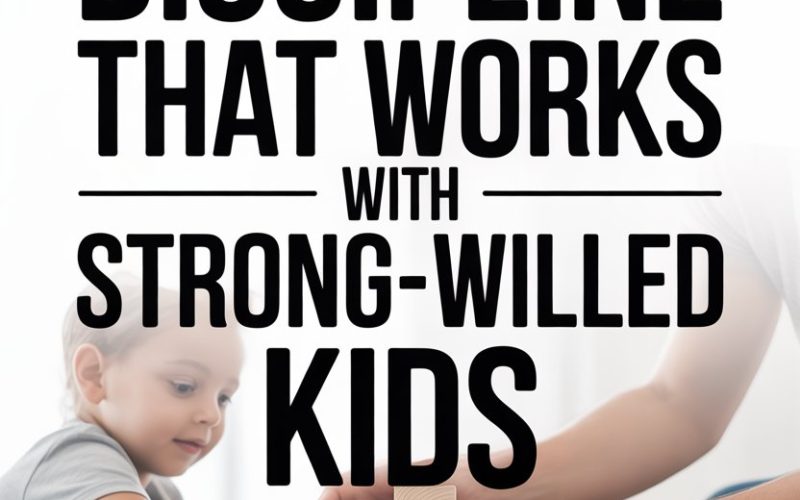Ever feel like you’re raising a tiny barrister who can out‑argue you before your morning coffee has hit your bloodstream? You’re not alone.
Having a strong‑willed child isn’t some cosmic punishment for that one time you lied to your own parents. It just means you’ve got a little human with a backbone—one who will almost certainly change the world (but not before testing every single limit you set).
If you’ve ever Googled “How to discipline a strong‑willed kid without losing my mind,” this one’s for you.
1. Connection Before Correction
Strong‑willed kids have finely tuned radar for power struggles. Simply put, the more you push, the harder they dig in their heels.
The secret sauce? Building connection before diving into correction.
Dr. Laura Markham, author of Peaceful Parent, Happy Kids, points out that when children feel understood and respected, their resistance softens.
This isn’t about being a pushover. It’s about seeing your child as a partner rather than an adversary.
Try this: before stepping into the usual “No, you can’t have chocolate for dinner” routine, pause and acknowledge how much they want it. A simple, “Those chocolate biscuits do look tasty. I wish we could eat them for dinner too!” can work wonders.
It doesn’t mean you’re caving in—it means you’re showing them you get it. That empathy opens the door for cooperation.
Ever notice how your child is more likely to listen right after a cuddle, a giggle, or a moment of shared silliness? Science backs this up. Research from the University of Washington found that parent‑child connection predicts better cooperation and emotional regulation in spirited kiddos.
And if you’re thinking, “I don’t have time for all this connection when dinner’s burning and the baby is teething,”—even 60 seconds of eye contact, a gentle hand on the shoulder, or a whispered, “Hey, I’m on your team,” can make a difference.
2. Offer Choices, Not Ultimatums
Ultimatums are like catnip to a strong‑willed child. The minute they sniff out a power struggle, the standoff begins—and guess who has more stamina?
The antidote is offering genuine choices within the boundaries you set. Instead of “Put your shoes on now or we’re not going to the park,” try “Do you want to wear your red trainers or your boots to the park?”
This shifts the focus from compliance to autonomy.
Psychologist Ross Greene explains that kids who feel in control of their decisions are less likely to dig in.
The trick is to make sure all options are acceptable to you—no offering “broccoli or chocolate cake for tea” unless you’re ready to stand by it.
For older kids, choices can sound like, “Would you like to do your reading before dinner or after?” or, for tweens, “Do you want to talk about what happened at school now, or after you’ve had a breather?”
The win? Your child gets to flex their independence and you avoid turning every request into a Shakespearean drama.
3. Set Clear, Consistent Limits
Strong‑willed children are the ultimate boundary‑testers. They’re not trying to make your life hard (well, not all the time). They’re scientists, constantly testing cause and effect.
Consistent limits provide the security they crave—even if they act like tyrannical little despots in the process. The key here is clarity and predictability.
If screen time ends at 6 pm, then it ends at 6 pm, even if you get the Oscar‑worthy meltdown of the year.
Want a script? Try, “The rule is we put tablets away at 6 pm. I know it’s hard to stop, but we’ll try again tomorrow.” Say it. Stick to it. Empathize—yes. Waffle—never.
A longitudinal study published in Child Development found that children who experienced clear, consistent boundaries were more likely to develop self‑control and resilience.
If your child protests, see that as a sign the limits are working—they’re noticing, and that’s half the battle.
4. Focus on Problem‑Solving, Not Punishment
Old‑school discipline (think: time‑outs, threats, grounding for all eternity) often backfires with strong‑willed kids. The result? More resistance, less learning.
What actually shifts behaviour is collaborative problem‑solving. When a strong‑willed child feels heard, they’re far more likely to brainstorm solutions with you.
Suppose your child refuses to brush their teeth. Rather than launching into a lecture or doling out consequences, say, “I notice you don’t want to brush your teeth. What’s up?” Then, listen—really listen—to their answer.
Maybe the toothpaste is too spicy. Maybe they hate the routine. Together, come up with a fix.
Clinical psychologist Dr. Becky Kennedy teaches that involving kids in solutions nurtures ownership and accountability, instead of just compliance.
5. Model Emotional Regulation
Here comes the part that makes every parent wince (me too): our kids are always watching us. If we lose our marbles every time our child pushes back, how can we expect them to keep theirs?
Strong‑willed children, in particular, need us to demonstrate calm in the storm.
That doesn’t mean stuffing your frustration deep down next to your old mixtapes. It means showing it’s possible to feel big emotions and still act respectfully.
Try narrating your own self‑regulation out loud: “I’m feeling really annoyed right now, so I’m going to take a breath before I answer.”
This isn’t for dramatic effect. It’s teaching your child exactly what to do when they feel overwhelmed.
According to research from the Center on the Developing Child at Harvard, kids build their own self‑control through watching and practicing, not through endless lectures.
6. Give Respect to Get Respect
Many strong‑willed kids are hypersensitive to tone. The minute they sense they’re being bossed around or dismissed, the walls go up.
Speaking to them with respect—even in the middle of a standoff—shows them how they deserve to be treated and lowers their defences.
Swap, “Because I said so!” with, “I know you disagree, and I want to hear your thoughts. Let’s talk about it after dinner.”
Parent coach Janet Lansbury advises using what she calls “sportscasting”—describing what’s happening without judgment.
7. Pick Your Battles (and Surrender Sometimes)
Every strong‑willed parent knows: you simply cannot enforce every rule, every day, and stay sane. Asking, “Is this about safety, health, or core family values—or just my need to win?” helps you let the small stuff slide.
Research from the American Academy of Pediatrics confirms that positive discipline, not punitive measures, is most effective in teaching right from wrong.
What “Works” Actually Means
Strong‑willed kids aren’t broken. They’re spirited, tenacious, and—yes—absolutely exhausting. The discipline that works isn’t about squashing their will; it’s about guiding it, shaping it, and respecting it.
Connection before correction. Choices. Consistent limits. Problem‑solving. Modelling, respect, and picking your battles. These aren’t hacks; they’re the scaffolding for a lifelong relationship with your child.
Try one tonight. Even if you mess up (and you will, because you’re human), that in itself models something powerful: Strong‑willed doesn’t mean impossible.
It just means you’re raising someone with enough spark to light up your family—and maybe, one day, the world.





